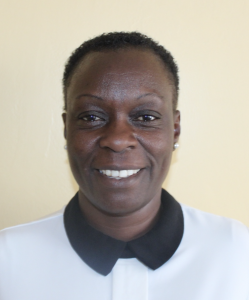Peninah Spring is located in Malava of Kakamega County. It is predominantly inhabited by the Kabras sub-tribe of the Luhyia.
A normal day begins at 5am. The wife of the house prepares children to go to school. She then proceeds to the farm where she spends most of the day either planting, weeding, or harvesting - depending on the season of the year.
Villagers practice small-scale farming by planting food crops such as sugarcane, maize, cassava, and beans. They also keep dairy cattle. A good number of the community members have wood lots on their pieces of land, which serve as a source of firewood and also for income generation when they sell the trees for timber or building projects. Some families oversee fish ponds that are filled with water from Peninah Spring.
Water
Peninah Spring serves 20 households who use the water for drinking, irrigation during dry seasons, and household chores.
Fetching water is predominantly a female role. Members of the community use small plastic containers to draw water from the unprotected spring and pour it into large plastic jerrycans. After drawing the water they carry it to their respective homes.
A member of the community visited Matete Girls Secondary School that had benefited from the construction of a 50,000-liter water tank. Upon inquiry, he visited the office and explained that he had an unprotected spring in his community.
"For a long time, this spring remained unprotected. It is a reliable source of water and serves many members of the community. It does not dry up during the dry season," Mrs. Beatrice Mukhwana, a resident near the unprotected spring, explained.
"This community will greatly appreciate the protection of this spring"
This spring is open to contamination, predisposing its users to waterborne diseases, such as typhoid, diarrhea, amoeba, and malaria.
"It is a God-given opportunity and the idea of protecting the Peninah Spring will solve their water problems," another community member said.
Protecting the spring will help empower the female members of the community by allowing them more time to engage and invest in income generating activities. In addition, protecting the spring will ensure that the water is safe, adequate, and secure.
Sanitation
Less than half of all households have latrines. It was noted that quite a number of homes still do not have pit latrines with some people forced to share sanitation facilities.
In the community, we observed toilets with walls made of iron sheets. Some had mud walling. On other occasions, the walls are made of timber. The cleanliness of most toilets in the community is poor.
Some members of the community have compost pits in which they throw litter or garbage. Upon decomposition, the manure is used in the farms during planting season.
The sanitation facilities and health promotion campaign will enable, enlighten, and build the capacity for the community to take action on matters related to community health.
The community is willing to provide the locally available materials (sand, bricks, gravel) and to attend health and hygiene trainings.
Here’s what we’re going to do about it:
Training
Community members will attend hygiene and sanitation training for at least two days. This training will ensure participants have the knowledge they need about healthy practices and their importance. The facilitator plans to use PHAST (Participatory Hygiene and Sanitation Transformation), CLTS (Community-Led Total Sanitation), ABCD (Asset-Based Community Development), group discussions, handouts, and demonstrations at the spring. One of the most important topics we plan to cover is the handling, storage, and treatment of water. Having a clean water source will be extremely helpful, but it is useless if water gets contaminated by the time it’s consumed. Handwashing will also be a big topic.
Training will also result in the formation of a committee that will oversee operations and maintenance at the spring. They will enforce proper behavior around the spring and delegate tasks that will help preserve the site, such as building a fence and digging proper drainage. The fence will keep out destructive animals, and the drainage will keep the area’s mosquito population at a minimum.
Sanitation Platforms
On the final day of training, participants will select five families that should benefit from new latrine floors.
Training will also inform the community and selected families on what they need to contribute to make this project a success. They must mobilize locally available materials, such as bricks, clean sand, hardcore, and ballast. The five families chosen for sanitation platforms must prepare by sinking a pit for the sanitation platforms to be placed over. All community members must work together to make sure that accommodations and food are always provided for the work teams.
Spring Protection
Protecting the spring will ensure that the water is safe, adequate and secure. Construction will keep surface runoff and other contaminants out of the water. With the community’s high involvement in the process, there should be a good sense of responsibility and ownership for the new clean water source.

 Protected Spring
Protected Spring
 Rehabilitation Project
Rehabilitation Project



































